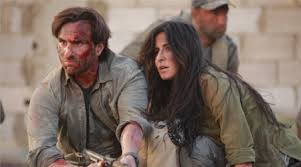(23 Nov) Be it “Kabul Express”, “New York” or his latest film “Phantom”, Kabir Khan’s films have openly discussed terrorism but the director says that cinema cannot combat this growing global menace, which is plaguing countries. Kabir says not all filmmakers think alike and some like him may be comfortable dealing with the problem of terrorism through films while others may not be. “Cinema can’t be carrying crusades; it is ultimately the individual filmmakers. If I feel strongly against terrorism then I will express it. But I don’t know if I will try and muster more filmmakers into making films against terrorism .
A lot of films are being made about global terrorism,” Kabir said in an interview on the sidelines of IFFI. “Cinema can help in making people think about issues and discuss and debate. It helps in throwing up certain questions. But it can’t directly help in fighting terrorism. I think that would be giving cinema a lot responsibility.” With the theme of terrorism,comes a lot of action, which is visible in all of Kabir’s movies. The “Bajrangi Bhaijaan” director says his films may have been high on action, but he has never glorified violence through them, which unfortunately some directors in Bollywood tend to do. “.
Yes there is a lot of violence being used in Bollywood films and sometimes it glorifies it in a certain way. It is a very tricky space. Sometimes to appeal to the youth, you can easily cross the line and go into a space where you would rather not venture. Ultimately, it is left to individual filmmakers to decide where he or she draws the line.” Kabir started his career working in documentary films in Afghanistan. He then made his feature film directorial debut in 2006 with “Kabul Express” which was partly inspired by his experiences in war-torn Afghanistan. The director says even though he has now become an established Bollywood filmmaker, he still might one day go back to making just documentaries. “When I was doing documentaries, there was no platform for it in our country. I wanted my work to reach the mainstream audience and so I shifted to films. But I can still one day take the camera, go somewhere and get back to making documentaries,” he said.











